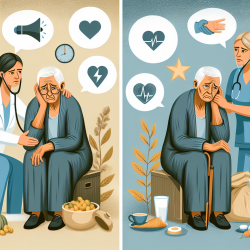As a speech-language pathologist committed to making data-driven decisions, understanding the role of care coordination in meeting the needs of children with special healthcare needs (CSHCN) is crucial. A recent study published in BMJ Open, titled "Care coordination and unmet need for specialised health services among children with special healthcare needs in the USA: results from a cross-sectional analysis of the national survey of children with special healthcare needs," provides valuable insights that can guide our practices and policies.
The study used data from the 2009-2010 National Survey of CSHCN to examine the need and unmet need for specialised health services, including occupational therapy (OT), speech therapy (ST), physical therapy (PT), home healthcare, durable medical equipment (DME), mobility aids, and communication aids. It also assessed the role of care coordination in ensuring these needs are met.
Key Findings
- Across all specialised health services, rates of unmet need were at or below 25%.
- Need and unmet need for most services were higher among CSHCN with emotional, behavioral, and developmental disorders (EBDPs) than those without.
- Adequate care coordination was associated with a greater probability of having needs for therapy, home health, and communication aids met.
Implications for Practice
These findings underscore the importance of effective care coordination in reducing barriers to healthcare services for CSHCN. As practitioners, we can take several steps to improve outcomes:
- Advocate for Adequate Care Coordination: Ensure that families have access to care coordinators who can help navigate the complex healthcare system and connect them with necessary services.
- Collaborate Across Disciplines: Work closely with other healthcare providers, educators, and community resources to create a cohesive care plan that addresses all aspects of a child's needs.
- Focus on Communication Aids: Given the high unmet need for communication aids, prioritize identifying and providing these resources to children who require them.
Encouraging Further Research
While this study provides valuable insights, there is a need for ongoing research to continue improving care for CSHCN. Future studies should focus on:
- Identifying specific barriers to accessing specialised services and developing targeted interventions to address these barriers.
- Exploring the long-term impact of care coordination on health outcomes and quality of life for CSHCN and their families.
- Examining the effectiveness of different care coordination models to determine best practices.
To read the original research paper, please follow this link: Care coordination and unmet need for specialised health services among children with special healthcare needs in the USA: results from a cross-sectional analysis of the national survey of children with special healthcare needs.










